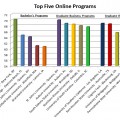 As online educational programs become more prevalent and advanced, perceptions about the effectiveness and value of these programs is changing. More Americans now perceive online educational programs as a viable, trustworthy alternative to traditional campus-based learning environments, according to a study by Gallup.
As online educational programs become more prevalent and advanced, perceptions about the effectiveness and value of these programs is changing. More Americans now perceive online educational programs as a viable, trustworthy alternative to traditional campus-based learning environments, according to a study by Gallup.
The results of a Gallup poll shed light on the growing acceptance of online colleges and universities among the general populace. During the period of Nov. 25-Dec. 15, 2013, Gallup surveyed a random sample of more than 1,000 American adults. Thirty-seven percent of survey respondents indicated they felt online colleges and universities delivered high-quality education. That is up from similar surveys conducted in 2012 (33%) and 2011 (30%).
In its separate 2013 Gallup-Lumina Foundation Business Leaders Poll on Higher Education, Gallup’s researchers found perceptions in the business world are also changing for the better in regard to online graduates.
An estimated 54% of business leaders polled said employers are at least somewhat likely to hire a candidate with an online higher education degree over a candidate with the same degree from a traditional campus-based school.
Gallup has also uncovered the value of the distance learning experience not only from the financial perspective, but in the workplace.
In a 2014 survey, Gallup demonstrated that distance students can enjoy a quality learning experience online. That study showed graduates of an online adult degree program were more engaged at work, had higher well-being and were more likely to be employed than other college graduates nationally.
A recent development at the Georgia Institute of Technology demonstrates the potential value and financial savings involved in pursuing online degrees, Gallup pointed out.
GIT launched an online master’s program in computer science that no longer has to be distinguished on a graduate’s resume. The cost for that program is $6,600, compared to the same on-campus program that costs $515 per credit hour for in-state students. Out-of-state tuition brings the cost up to $1,150 per credit hour.
Online college programs have come a long way in closing the perception gap to rival their traditional counterparts, but there is still work to be done, Gallup concluded. Their value, however, shouldn’t be discounted.
“As online colleges continue to grow and adapt to the needs of students and the marketplace, they have the potential to lower costs and increase accessibility to higher education, while imparting knowledge and skills that may be more relevant to today’s high-tech employers,” the study states.





